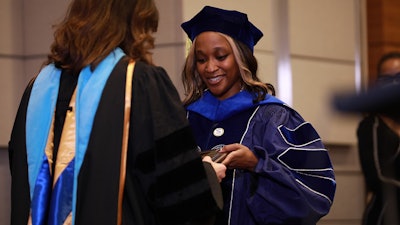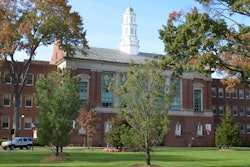The Alfred P. Sloan Foundation has announced the recipients of 10 seed grants to launch its Sloan Centers for Systemic Change (SCSC) initiative to transform their doctoral education programs in STEM fields.
 Dr. Christa Mahlobo is honored at a ceremony recognizing her attainment of a Ph.D. in human development from The Pennsylvania State University.National Action Council For Minorities In Engineering
Dr. Christa Mahlobo is honored at a ceremony recognizing her attainment of a Ph.D. in human development from The Pennsylvania State University.National Action Council For Minorities In Engineering
SCSC seed grantees include University of California, Berkeley; University of Colorado, Boulder; University of Nevada, Las Vegas; The Ohio State University; University of Pittsburgh; Portland State University; Purdue University; University of Texas, El Paso; Virginia Polytechnic Institute & State University; and University of Wisconsin, Madison.
“We know that we can make graduate education in STEM better for everyone,” said Dr. Adam Falk, president of the Alfred P. Sloan Foundation. “But systemic change is hard. What stands out about these institutions is their level of commitment and readiness. These are campuses that have a vision for how to do better and are eager to take the next step.”
Applications for funding were assessed for the quality of planned activities, the breadth of participating departments on campus, and the depth of institutional commitment to identifying and addressing systemic barriers to success in graduate education. Each awardee receives a two-year, $250,000 seed grant to develop plans and begin implementation of evidence-based policies and practices to advance a mission of equitable and diverse physical science and engineering doctoral programs with a focus on improving recruitment, retention, and graduation outcomes. The goal, according to Sloan Foundation officials, is the systemic reform of structures that disproportionately burden Black, Indigenous, and Latino individuals in graduate education.
The Sloan Foundation is also supporting each institution’s participation in the Equity in Graduate Education Consortium, a networked improvement community that equips participants with research, tools, and change management strategies to achieve systemic change.
SCSC initiative builds on Sloan’s University Centers for Exemplary Mentoring (UCEM) program, now concluding. That program aimed to bolster student success in graduate study through a combination of fellowship support, strong mentoring, and student-centered professional development. An independent assessment of the UCEM program found large, positive impacts on student outcomes, including much higher retention and graduation rates of participating Sloan Scholars than are observed nationally for underrepresented students.
“We’ve learned a lot from our UCEM institutions and from the scholars we’ve supported there,” said Dr. Lorelle L. Espinosa, program director of the Sloan Foundation’s grantmaking in higher education. “These new grants are designed to move beyond a focus on individual student success to also include changing the educational environment itself, using approaches that are legally sustainable.”
At the end of a successful two-year seed grant period, institutions will be eligible to apply for four-year, $1.4 million implementation grants from Sloan, which include scholarship funds for students in participating departments.
“The next two years are about laying the foundations for success,” said Espinosa. “I have no doubt that these 10 institutions are well on their way to becoming national leaders in reshaping STEM doctoral programs in ways that allow every student not only to succeed but to thrive.”



















